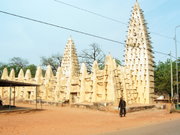
Religion in Burkina Faso
Encyclopedia

Islam
Islam . The most common are and . : Arabic pronunciation varies regionally. The first vowel ranges from ~~. The second vowel ranges from ~~~...
, and that the majority of this group belong to the Sunni branch, while a growing minority adheres to the Shi'a branch. A significant numbers of Sunni Muslims identify with the Tijaniyah Sufi order. The Government also estimated that 19 percent practices Catholicism
Catholicism
Catholicism is a broad term for the body of the Catholic faith, its theologies and doctrines, its liturgical, ethical, spiritual, and behavioral characteristics, as well as a religious people as a whole....
, 15.3% follow Traditional indigenous beliefs
African Traditional Religion
The traditional religions indigenous to Africa have, for most of their existence, been orally rather than scripturally transmitted. They are generally associated with animism. Most have ethno-based creations stories...
, 4.2% are members of various Protestant denominations, 0.6% have other religions and 0.4% have none.
Statistics
This shows the large level of acceptance of the various religions amongst each other. Even for Muslims and Christians, ancient animist rites are still highly valued. The Great Mosque of Bobo-DioulassoBobo-Dioulasso
Bobo-Dioulasso is a city with a population of about 435,543 , the second largest city in Burkina Faso, Africa, after Ouagadougou, the nation's capital. The name means literally, "home of the Jula who speak Bobo," and is possibly a creation of the French who misunderstood the identity complexities...
was built by people of all faiths working together.
Statistics on religious affiliation are approximate because Syncretism
Syncretism
Syncretism is the combining of different beliefs, often while melding practices of various schools of thought. The term means "combining", but see below for the origin of the word...
, incorporating traditional indigenous beliefs and practices, is widespread among both Christians and Muslims. The majority of citizens practice traditional indigenous religious beliefs to varying degrees, and strict adherence to Christian and Muslim beliefs is often nominal. Almost all citizens are believers and atheism
Atheism
Atheism is, in a broad sense, the rejection of belief in the existence of deities. In a narrower sense, atheism is specifically the position that there are no deities...
is virtually nonexistent.
Geography
Muslims reside largely around the northern, eastern, and western borders, while Christians live in the center of the country. People practice traditional indigenous religious beliefs throughout the country, especially in rural communities. OuagadougouOuagadougou
Ouagadougou is the capital of Burkina Faso and the administrative, communications, cultural and economic center of the nation. It is also the country's largest city, with a population of 1,475,223 . The city's name is often shortened to Ouaga. The inhabitants are called ouagalais...
, the capital, has a mixed Muslim and Christian population; however, Bobo-Dioulasso
Bobo-Dioulasso
Bobo-Dioulasso is a city with a population of about 435,543 , the second largest city in Burkina Faso, Africa, after Ouagadougou, the nation's capital. The name means literally, "home of the Jula who speak Bobo," and is possibly a creation of the French who misunderstood the identity complexities...
, the country's second largest city, is mostly Muslim. Small Syrian and Lebanese
Lebanese people
The Lebanese people are a nation and ethnic group of Levantine people originating in what is today the country of Lebanon, including those who had inhabited Mount Lebanon prior to the creation of the modern Lebanese state....
immigrant communities reside in the 2 largest cities and are overwhelmingly (more than 90 percent) Christian.
Ethnicity
There are more than 60 different ethnicities in the country. Most ethnic groups are religiously heterogeneous, although the FulaFula people
Fula people or Fulani or Fulbe are an ethnic group spread over many countries, predominantly in West Africa, but found also in Central Africa and Sudanese North Africa...
and Dioula communities are majority Muslim.
See also
- Islam in Burkina FasoIslam in Burkina FasoIslam in Burkina Faso has a long and varied history. According to the 2006 census, the population of the country is 60.53 percent Muslim....
- Roman Catholicism in Burkina FasoRoman Catholicism in Burkina FasoThe Roman Catholic Church in Burkina Faso is part of the worldwide Roman Catholic Church, under the spiritual leadership of the Pope and curia in Rome...
- Freedom of religion in Burkina FasoFreedom of religion in Burkina FasoThe Constitution of Burkina Faso provides for freedom of religion, and the Government generally respects this right in practice. Government policy contributes to the generally free practice of religion...

